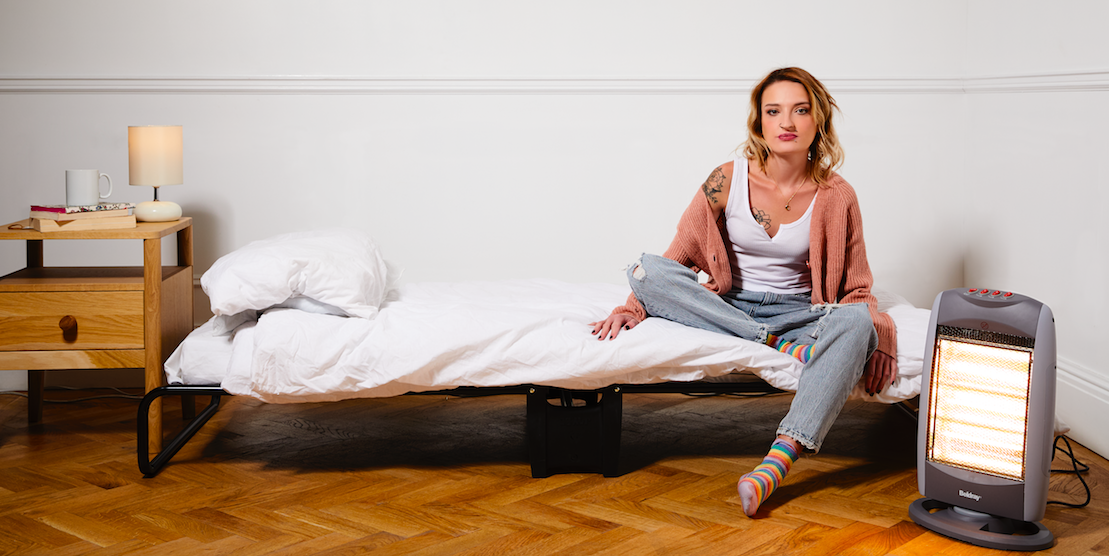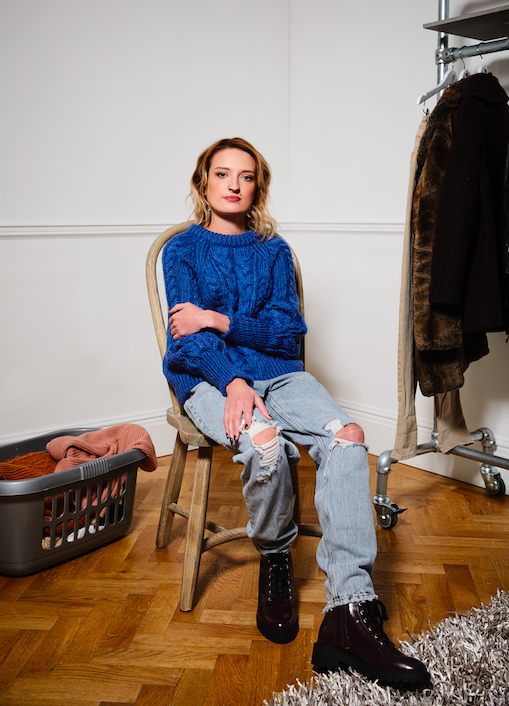The hidden reality of female poverty in the UK

A higher proportion of young people today live in poverty than ever before, and for women in particular, the problem is getting worse. But are we noticing it? Have you ever spotted a friend's empty fridge? Or the one who's always sofa-surfing, never seeming to settle? What about the housemate who's always late with rent? Would you recognise poverty if it was staring you in the face?
With her eyes firmly glued to the pavement, Catherine hurries along her local high street. Her hands are grasped tight around the top of a plastic bag. She glances around her, searching frantically for faces she recognises: terrified of seeing someone she knows. Even when strangers pass she holds the plastic bag tighter, trying to conceal it any way she can. She doesn’t want anyone to spot the white drawstring at the top of it. The bag she's clutching holds a weight heavier than the tins inside it. It feels like a huge, red flashing arrow pointing directly at her. One that yells: this woman uses a foodbank.
Years later on a sticky Tuesday in August, Catherine meets me at the train station in Keighley, the small town in Yorkshire where she lives. She’s wearing a floral minidress, a leather jacket and has a pair of oversized sunglasses balanced on the top of her head. She has enviably clear skin and is covered in labyrinthine inkings wrapping around her arms and legs; I recognise the etching of a girl holding a red balloon on her left calf: it's a near perfect replica of one of Banksy's most famous works. She chats to me about her favourite band (Alkaline Trio), books she's read recently (anything by Kurt Vonnegut) and her cat. As we weave our way through the streets the conversation changes, but her casual relaxed tone does not. The scar on her forehead; the homes where she lived in daily fear; the men who abused her... all byproducts of the fact that 26-year-old Catherine has lived in poverty for most of her adult life.
The reality
For young people, and women in particular, the poverty trap is getting worse. The number of people 'exiting' poverty is at its lowest in a decade, and there are 5.2 million women in the UK currently living in it, compared with 4.7m men – according to The Joseph Rowntree Foundation, an independent charity who are working to try and solve the issue within the UK. And while the number of single men in poverty has decreased, the number of single women has stalled, making them a particularly at risk group. Especially as the benefits system - where couples living together are given money only to one of the pair, (usually the man) - can lead to financial abuse. Safe houses and women's refuges are also continually facing closure: one in six has closed over the past eight years.
With the UK economy in such turmoil, many of us worry about our financial situation. Cosmopolitan research showed that 59% of you do not have enough money saved to support yourself if you were to become suddenly unemployed and needed to job-hunt. Many of us worry that we will have to use our safety net, but that's not what true poverty means. For women like Catherine there no safety net. Every decision she has made – from the moment she was born into abuse, poverty and neglect – has been simply to survive. To stay off the streets.
Almost ten years before we meet, Catherine found herself crunched tight into a ball in a hallway, her knees pressing the breath out of her chest, her back against a radiator. She could feel the cold steel prickling her skin, the indents pressing either side of her spine. All she could focus on was her desperation, the fear that paralysed her. She was just 17 and she had nowhere to live. She was overwhelmed by the realisation that, for the first time, she might have to sleep rough.
“Poverty forces you to depend on people you otherwise never would,” she says. For Catherine this includes the hostel she lived in as a teenager, trusting that her neighbours – adults, many of whom had addiction problems – wouldn’t steal her things. When they did, she turned to an older boyfriend. He was abusive, but at least she could live somewhere warm. When he hurt her so badly one night that she knew she had to get out, Catherine called a relative in desperation. She was offered just one night with them… after that it was three weeks on the streets, while she waited for housing - all the time thinking that, somehow, where she had ended up was her fault, that she deserved it.
"The constant stigmatisation means you feel like you have nothing to offer," she explains. "It really affects your self-esteem so you end up feeling like you have to make yourself worthy. Trying to have confidence when you feel like you don’t deserve it is really hard. You start thinking, ‘it’s me, it’s my fault’.”
The stigma that Catherine has experienced; so targeted, so unrelenting, has long-term impacts that last a lifetime. A persistent lack of understanding of her reality from those around her has followed Catherine around most of her life. A few years ago when she tried to get qualifications, she discovered that the course materials were all online. When she asked her tutor what she was meant to do without internet or a laptop, he replied: “in what day and age does someone not have the internet?” Or the time she invited a friend over to the house she was staying in, and they just shook their head and said “why do you live in this sh*thole?” All these moments further compounded her shame, confirming the pre-existing idea that Catherine must somehow be to blame; that it was her choices that led to this. Except, like so many other women in her situation, there was no ‘out’, no last resort; Catherine didn’t have the luxury of choice.
Feeling the stigma
Gwen was four years old when she realised her life was different to everyone else’s. "I noticed we were always eating from bulk cooked meals and that I didn’t want to eat much so that we would have food left over for our next meal,” she says, explaining that she was born into a home on the poverty line, after her father’s injuries left him unable to continue in the army and her family lost its main source of income. “I realised that other people at school weren’t doing that.”
Twenty years later, working as a healthcare assistant in Guildford, and Gwen can still feel the creeping sensation of humiliation that came from the stigma she suffered. As a child Gwen and her four siblings were eligible for free school meals, and as grateful as she was, it drew attention to them, when they desperately just wanted to fit in. Teachers would pull Gwen and her siblings out of lessons, openly checking them for nits in front of the other children - and not checking others. And when the family was really desperate Gwen would visit foodbanks, taking a rucksack with her to hide the bag in, but word always got around. Like Catherine, Gwen always felt a persistent need to earn the approval that others took as standard; “I would try to please other kids at school by giving them food from my free meals, even though they weren’t really my friends, but I always felt like I had to prove myself.”
Later, as a teenager Gwen remembers saving up as much money as she possibly could - £50 - to buy clothes with designer labels in her local charity shop. She was starting in college, a place where nobody knew who she was. "I wanted that stigma gone," she says. "As an adult I’ve hidden the fact that I’m on the poverty line. I just don’t want to be judged. I’m fed up of it.”
Today Gwen has to share bathwater with her son. She keeps the heating off from April to October and bulk buys bags of 10p pasta so she knows that there's at least always something for the pair to eat; “most of my life I’ve had to make one meal last a day, and my portion sizes are hilariously small” she tells me, chuckling wryly. Yet her work colleagues would never guess - never thinking twice about her tupperware full of leftovers; "it's just something I made last night", she tells them, masking the seriousness of the situation.
The gender divide
Charity research shows that women will go to great lengths to hide the realities of poverty from others, from staying with abusive men, to going without food. Catherine would not only shield her foodbank bag from prying eyes, but – in the past - she's accepted invites for meals out - sitting in restaurants knowing that paying for this meal will mean she won't have any money left for the rest of the month. And she’s gone to friends' houses for sanitary products when she couldn’t afford tampons. Only a select few of her friends have ever known her living situation.

When women do end up on the streets they often work tirelessly to remain hidden: St Mungo’s, a London based homelessness charity, found that women who are forced into sleeping rough take drastic measures to conceal themselves, by hiding away from town centres, sleeping in peoples garden sheds or wearing baggy clothes and cutting their hair to disguise their gender. All of which means we end up thinking of poverty and homelessness as a male problem, when really there are far more women living in poverty and living with homelessness than we realise, they are just experts at masking it.
So why do young women in poverty feel such pressure to hide it? You only have to look back at the ignorance Catherine and Gwen have encountered for an answer. From Catherine's university tutor who saw the internet as a basic essential, to the teachers who openly humiliated Gwen and her siblings, poverty is dehumanising and societally, we’ve been led towards believing an unproven stigma, one that allows authorities to shift the blame for the problem onto those it most deeply affects. Through research into public misconceptions surrounding poverty, JRF found that one of the central issues was the public belief in “self-makingness” – the idea that those in this situation had somehow caused themselves to be there.
“Most people in this situation, we haven’t had the same opportunities as others. Why are we demonising people who have typically suffered trauma and horrific upbringings? You have to rebuild your identity from the ground up," Catherine says. "Luckily I had Centrepoint [a homelessness charity for young people].”
Centrepoint pulled Catherine out of her lowest low, setting her and a friend up in a flat in Bradford together, “They were amazing with me, they helped me feel like a human again; I had two support workers and at least one of them would come and see me everyday, they got me into my doctors, got me into a wellbeing group and from there I started volunteering and getting involved with their work.” Both Catherine and Gwen know that it is charities and new-found support networks that will help them when the system does not.

Now, Catherine mentors five young people at risk of similar suffering, she regularly speaks at events, is part of Centrepoint’s youth parliament and studying for a qualification in adult social care. She’s ballsy, intelligent and strong and she is arguably the very definition of hope for others born into situations of poverty. And yet, - here’s the real kicker - always beneath the surface she is battling the effects of her past trauma; fearful and distrustful of things going well, “I’m scared of life, I’m scared that if something good happens or things start to go well, it might disappear.” When meeting new people Catherine still finds that she feels the familiar pang of shame and the itching need to explain herself, despite everything. Our research showed 75% of Cosmopolitan readers believe that worrying about money affects their mental health. We're able to acknowledge the affect our own money worries have on us, so why do we all find it hard to sympathise to women like Catherine and Gwen? Isn't it time we stopped letting the stigma run riot with our human compassion?
At the end of our day together Catherine walks me back towards Keighley station. As we chat aimlessly about the weather, she suddenly changes the subject, “I read the piece you wrote about your mental health,” she tells me unprompted, as we walk towards the busy high street. “That sounded really tough”, she said as I struggled to find the words to respond to such compassion. Like Catherine says, it’s often the people that have the least who give the most.
If you’re between the ages of 16 and 25 and need free, confidential advice about homelessness call Centrepoint on 0808 800 0661. Or call Shelter on 0808 800 4444. Click here to donate to Centrepoint.
Like this article? Sign up to our newsletter to get more articles like this delivered straight to your inbox.
You Might Also Like


